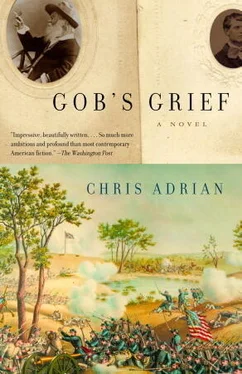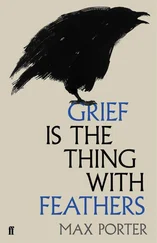“Poor Mr. Booth,” said Madame Restell, many days later, meaning Edwin. “I saw him in Macbeth. I think his anguish will inform that role, if he ever plays it again.”
“I think I would hide forever, if my brother did such a thing,” said another guest. “I could never forgive such atrocity.” The Urfeist had a funereal feast, on the eve of the arrival of the late President’s body in New York. Gob, trotted out again to amuse the Urfeist’s friends, wanted to say that a brother ought to forgive a brother any misdeed, any at all. He wondered if Tomo might still be angry at him.
Gob felt sick. He’d eaten too much, and the guests were making him dizzy with their demands upon his memory. The Urfeist had made him memorize the minutes of Dr. Abbott, the physician attending at Mr. Lincoln’s death.
“Eleven thirty-two p.m.,” said Madame Restell, continuing the game.
“Pulse forty-eight,” said Gob. “Respirations twenty-seven.”
“One forty-five a.m.,” said another guest.
“Pulse eighty-six. Patient is very quiet. Respirations are irregular. Mrs. Lincoln is present.”
“Six o’clock!” said an excitable lady. “Is he dead yet?”
“Pulse falling,” said Gob. “Respirations twenty-eight.”
“Seven o’clock,” said the same lady.
“Symptoms of immediate dissolution,” said Gob.
“Will he never die?” the lady asked.
“Patience, my dear,” said the Urfeist. “Seven twenty-two.”
Gob said, “Death.”
“Hate death. It is the only sensible thing to do. What pale thin shields the living hold up against him! Nevermore with anguish laden! Sweet rest! Let us cross over the river and rest beneath the shade of the trees! Let us recline in the dank grave. Let us become wispy hurting creatures. Let us desire flesh, sunlight, a cheek laid against our own, let us even desire the sting of a bee. Spirits will do anything for a taste of flesh — this is the wisdom of the necromancer, who does not love death, but hates it, hates how it lurks under every thing, every root and leaf, every creature’s skin. Every dumb child’s happy face is a mask by which death hides his own smiling face from the world. Do you know how death mocks us? A world is not fair that says, ‘Partake of these days while I ruin them,’ for what joy can you have when every last thing exists only so it may one day be taken away from you? Do we not want eternally? Do we not love eternally? Do we not hate eternally? Why then is death a miser? Why does he steal our allotment of forevers? Why does he lick me every day with his wet hungry gaze and say, ‘Though you still live and breathe, do you see how you are already dead?’ Do you see how you could spend a whole life grieving for your own self? Don’t you hate him, my ugly one? If only you weren’t so ugly and stupid, if only you could make a determinate motion to wound smug death. If only you were not destined for laziness and failure, for dreams instead of works.”
“They say she is a female Wendell Phillips,” said the Urfeist, speaking of Mrs. Burleigh of Brooklyn. He’d brought Gob to see her lecture on the condition of children in society. All part of his continuing edification, the Urfeist assured Gob, who felt tricked. He’d been under the impression that he was being taken to see handsome, inspiring Anna Dickinson, not some lesser-light nobody from across the river.
Mrs. Burleigh was lecturing at Association Hall, under the aegis of the Sorosis Club, which sounded to Gob like an association for the diseased. Organ music played as the audience got settled, and Gob watched Mrs. Burleigh, red-faced, vital-looking, and pregnant, sitting quietly at the foot of the stage. Her tapping foot disturbed her skirts in rhythm to the music, until a thin, birdlike woman arose from the audience to introduce her as “the very best friend of our nation’s children.” This brought a rush of applause from the audience, and a cry of “Huzzah for Ms. Phillips!” from the back.
“My name is Burleigh, thank you sir!” said Mrs. Burleigh. She bowed her head a few moments, as if in prayer, and then spoke: “The general principle acted on in the world is that children have no rights which we are bound to respect!”
She elaborated on this bold statement while Gob shifted in his seat, too restless to care if the Urfeist punished him later for squirming. “What has she got to do with the machine?” he asked.
“Hush,” said the Urfeist, and gave him a sharp poke in the side. “You will see.”
“Quiet and care are essential to a child’s welfare,” said Mrs. Burleigh. “Cigar-smoking fathers and gin-drinking nurses are to be avoided. Heavily corseted mothers set a bad example. The groping uncle is anathema in any family not set on the ruination of its children.”
The Urfeist frowned and reached into his pocket. He removed a silver box about the size of his palm. When he opened it, Gob saw that it was full of a fine yellow powder, and thought it must be sulfur. He moved his face over to take smell it, but the Urfeist pushed his head away roughly. “It wouldn’t do,” the Urfeist said, “to have a sniff.” He set some on his palm and raised it to his lips, then blew it towards Mrs. Burleigh.
“What is it?” Gob asked.
“Watch,” said his teacher. Their neighbor in the hall, a lady in a pink hat and a wine-red velvet dress, hissed at them. The Urfeist brought a handkerchief to his face and breathed through it, and indicated that Gob should do the same. All around, people began to sniff and wipe their eyes as Mrs. Burleigh detailed the plight of American children, depicting them as hapless, abused innocents. People began to weep openly. The lady in the wine-red dress lost her scowl, took a deep breath, and uttered a series of quick little sobs.
“Yes, weep!” said Mrs. Burleigh. “Weep, as the chimney boy cries out ‘Weep, weep’ for his living and his plight! We are every one of us their tormentors!” She was weeping, too, throwing tears from her face with rough swipes of her hands.
“What did you do?” asked Gob.
“It’s your hideous face,” the Urfeist said, smiling. “Which brings strangers to tears.” The situation was deteriorating. Mrs. Burleigh’s chest was heaving, even as she warned against the dangers of too much kissing of children. She decried it as an invasion of bodily privacy.
“They are not your kissing-dolls, Israel. Oh no, they are not!”
Gob was careless with his handkerchief. He breathed the tainted air, and felt overcome by sadness. He began to cry, not in tribute to the woes of childhood, but because it seemed to him in that moment that every last thing in the world was unbearably sad.
“What did you do?” he asked again on the way home. “What is that yellow powder?”
“A simple concoction,” said the Urfeist. “I will demonstrate its making.”
“It makes people sad?”
“No. It makes nothing. It releases sadness. Every last creature is sad. Do you know why?”
“They miss their dead.”
“No!” he said. He looked around him for the paddle, and when he could not find it, gave Gob’s head a slap with his naked hand. “No, it is not that they miss their dead. Not that they mourn their beloveds. They mourn themselves. They are sad because they know that they are going to die.”
In May of 1865, Gob got an idea from a dream of dead soldiers. A great company of them lay in an open grave and chattered their teeth. How cold they are! Gob said to himself, and he wondered how to warm them. He could not figure that out, but it did occur to him that the noise of their teeth was very much like the noise of a telegraph. He knew the code, and listening very carefully he made out a message— Bring us back. Gob woke from the dream, rushed into his workroom, and started work on a spiritual telegraph.
Читать дальше












